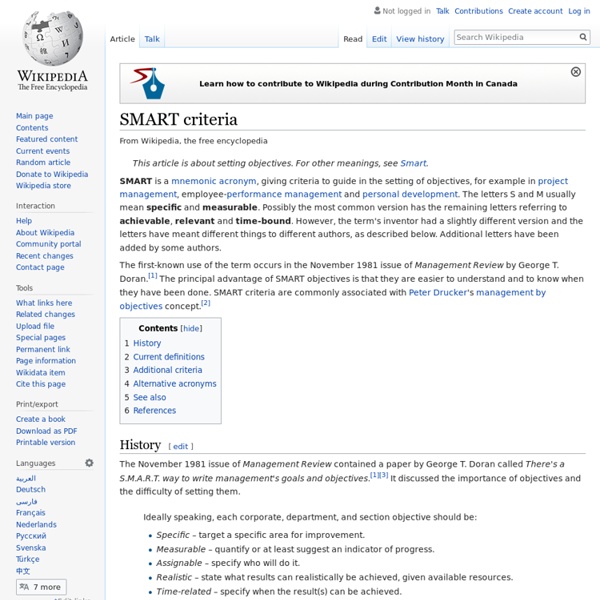SMART criteria

PROJEKTMANAGEMENT BLOG
SMART Goals
Once you have planned your project, turn your attention to developing several goals that will enable you to be successful. Goals should be SMART - specific, measurable, agreed upon, realistic and time-based. A goal might be to hold a weekly project meeting with the key members of your team or to organise and run a continuous test programme throughout the project. The acronym SMART has a number of slightly different variations, which can be used to provide a more comprehensive definition for goal setting: S - specific, significant, stretching M - measurable, meaningful, motivational A - attainable, agreed upon, achievable, acceptable, action-oriented R - relevant, realistic, reasonable, rewarding, results-oriented T - time-bound, time-based, timely, tangible, trackable This provides a broader definition that will help you to be successful in both your business and personal life. When you next run a project take a moment to consider whether your goals are SMART goals. SMART Goals Specific Measurable
Projektmanagement
Als Projektmanagement (PM) bezeichnet man das Initiieren, Planen, Steuern und das Kontrollieren und Abschließen von Projekten. Viele Begriffe und Verfahrensweisen im Projektmanagement sind mittlerweile etabliert und standardisiert. In den Studiengängen der Ingenieurwissenschaft, Wirtschaftswissenschaft und Informatik werden Grundkenntnisse des Projektmanagements vermittelt. Weltweit gibt es Verbände, welche sich dem Projektmanagement verschrieben haben. Die drei bekanntesten sind: das amerikanische Project Management Institute (PMI) mit der PMP-Zertifizierungdas britische Office of Government Commerce (OGC) mit der Prince-2-Zertifizierungdie International Project Management Association (IPMA) mit der IPMA-Zertifizierung Deren Vertretungen in den Ländern, in Deutschland z. Ihre Verfahren sind grundsätzlich unabhängig von Branche und Projektinhalt. Definitionen Projektmanagement[Bearbeiten] Verzahnung des Projektmanagements mit dem Gesamtprojekt Einführung[Bearbeiten] Magisches Dreieck
List of project management software
From Wikipedia, the free encyclopedia The following is a comparison of project management software. General information Features Monetary features See also Notes ^ a b Includes a very simple time tracking mechanism, enough to produce relevant data for invoicing as well as to compare it with the actual overall budget. References
Related:
Related:



